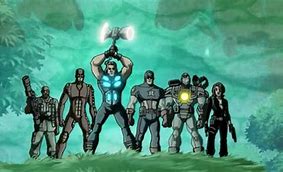PHENOMENALITY: *marvelous*
MYTHICITY: *fair*
FRYEAN MYTHOS: *adventure*
CAMPBELLIAN FUNCTION: *cosmological, psychological*
Whereas ULTIMATE AVENGERS was just a pedestrian failure, ULTIMATE AVENGERS 2-- released a few months later during the same year and written by the same writing-team-- is more the "interesting failure." The first film, allegedly based on Marvel's ULTIMATE AVENGERS comics-franchise, was concerned only with setting up its version of "how the Avengers came together," here consisting of Thor, Iron Man, Captain America, Black Widow, Hulk, Giant-Man and Wasp. But this time the writers made an attempt, however clumsy, to emulate the emotional melodrama of Marvel Comics-- which is more than a lot of the live-action iterations have tried to do.
Some of the melodramatic setups seem more like excuses to get some of the cast-members out of the way. Since the first movie showed Bruce Banner getting in dutch with SHIELD for transforming himself into his emerald alter-ego, in Part 2 Banner's been locked down in a containment cube while a SHIELD doctor questions him. This effectively keeps Hulk out of the action till near the end. Thor isn't much different. The thunder-god spends a lot of time quarreling with his all-father about hanging out with humans too much, only to pitch in at the climax. Iron Man's about the same narcissist as always, and Black Widow tries to play den-mother to the group, but suddenly Captain America becomes obsessed with crusading to distract himself from time-displacement. This idea could have been done well, but once the main conflict-- another invasion by those dull ET-evildoers the Chitauri-- Cap's inner crisis gets kicked to the curb. For no particular reason Giant-Man becomes a snark-meister, alienating his wasp-winged girlfriend-- perhaps because this series lacked a Hawkeye for that function?
On top of all that, an eighth potential Avenger comes into the mix: the Black Panther. The hero's new origin is at least less encumbered than the one from the MCU's 2018 movie, bringing in a potentially good conflict between the reactionary attitudes of the Panther's subjects and the Panther's relative commitment to interaction with the First World countries. This time T'Challa attains the kingship thanks to a shapechanging Chitauri who spends most of the film looking like a leftover Nazi officer. The explanation for this peculiar affectation is that during the Chitauri's covert involvement during WWII, the shapechanger took the identity of a Nazi officer named Kleisser, in which form he killed Captain America's partner Bucky. There's no explanation as to why "Kleisser" continues to look like a Gestapo chief sixty-something years later, when he kills T'Challa's father. The extrinsic reason for the nasty-Nazi guise is to keep reminding viewers that he's the same entity on whom both Cap and the Panther desire vengeance-- though when they finally do, it's very underwhelming, even when the Panther's. inexplicably acquired the ability to morph into a panther-man shape.
At least I know what the writers were going for with giving two heroes the same enemy. But I have no clue as to what they were going for by making Giant-Man an overly critical douchebag. He rails on The Wasp, possibly because she's funding his research with her superior wealth and he resents that he needs her help. But again, this melodramatic point is just dropped later so that the character can undergo a sacrificial death. On top of all that, the action scenes are mediocre. The only standout moment occurs when Wasp, using some hyped-up strength, actually slams her way through a squamous Chitauri body and kills the ET dead.




No comments:
Post a Comment